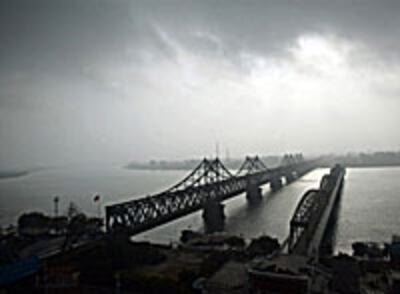
SEOUL—Authorities in North Korea have launched a high-level probe into two government bodies responsible for administering foreign investment in the isolated Stalinist state, in a rare acknowledgment of corruption in the Workers’ Paradise.
Overseas investors say the National Economic Cooperation Federation (NECF) is being probed by Pyongyang officials after frequent complaints from investors—who are mostly South Korean—that they were being ripped off.
The North Korean People’s Council for National Reconciliation, which deals with ties with South Korea, is also under investigation following reports of corruption.
While corruption affects every aspect of North Korean life, the probe comes in response to complaints from foreigners, upon whom Pyongyang relies for food aid and investment.
Too-big government
Money can buy anything in North Korea.
Kang Chul Hwan, North Korean defector and co-director of Democracy Network against North Korean Gulag, said government in the communist state was far too big.
“Economic distress and the size of government is the root of all evil in North Korea,” Kang said. “North Korean government agencies are too numerous and too big, and the only way to support these agencies and their officials is to squeeze it out of the already hard-pressed people.”
And Lee Dong Hoon, who defected from North Korea in 2006, said abuses by government officials affect all walks of life, from farming to the distribution of food aid.
“Government officials submit doctored reports in order to distinguish themselves and gain recognition from their superiors and Kim Jong Il,” Lee said.
“Corruption in North Korean authorities has exceeded all conceivable limits. Bribes are required for everything, from getting a travel permit to obtaining the references needed to enter a good college,” he added.
Korean investors say the corruption allegations are linked to the import of cheap fisheries and farm produce into South Korea, which waives its very high duties on agricultural and fishery imports for produce from North Korea.
Investor interest grows
They say the NECF is being probed for its role in a common smuggling scam in which Chinese agricultural produce and fisheries are brought into North Korea and shipped out again to South Korea duty-free, as North Korean produce, from the North Korean port of Nanpo to the South Korean port of Inchon.
South Korean authorities have uncovered instances where Chinese sesame was imported into South Korea following that route.
The NECF is accused of issuing fake “Made in North Korea” certificates for Chinese goods and of taking large bribes in order to do so.
North Korean labor is cheap and relatively well-qualified, so many overseas Korean entrepreneurs are interested in moving production lines to North Korean factories.
NECF employees are also accused of demanding large bribes in order to put potential investors in touch with factory managers and officials who can make such investments happen.
According to one South Korean investor, his approach to the NECF with a plan to set up a red pepper paste factory was met with the question: “How much are you willing to invest in the fatherland?” Later, it transpired that this was a veiled demand for a bribe of U.S. $50,000.
Overseas rights groups have called on international agencies to put more pressure on Pyongyang to show exactly what happens to food and financial aid.
Kay Seok, North Korea researcher at the New York-based Human Rights Watch, said food aid should be disbursed to North Korea only if strict monitoring was allowed.
Call for transparency
“If that were the case, and the international society of nations spoke in one voice, little could stand in the way of advocating for curbing corruption in North Korea,” she said, citing similar conditions imposed on loans and grants to Vietnam.
“Assistance could be extended to North Korea under the condition that the government provides some transparency,” she said, adding that corruption among officials “severely aggravated” the already calamitous human rights situation.
But some experts say the problem is so deeply rooted that it would still exist even in the event of a change of political system.
“Even if the North Korean economy improved, even if the Kim Jong Il regime collapsed, the corruption rooted in the Kim Jong-Il era would remain as one of North Korea’s most difficult social problems,” said Kookmin University professor Andrei Lankov.
“While further ruining the North Korean economy, corruption is in North Korea to stay, and is likely to remain one of North Korea’s major social problems for the next few decades,” Lankov said.
Kim Tae San, a former official at the North Korean Embassy in Prague, and former president of a North Korean state shoe factory in the Czech Republic, agreed.
“Government officials have money, and they are well connected with other officials in all government agencies. Practically, they can even get away with murder, so ordinary people can hardly consider reporting corruption and abuse. That is why nobody can do anything to root out corruption in North Korea,” he said.
Other defectors report that the giving of bribes is a prerequisite to any form of contact with officialdom.
“In North Korea, in order to enter a good college or for many other purposes, recommendations from direct supervisors are needed, and the best way to obtain these recommendations is to give a bribe,” defector and movie director Chung Sung San said.
“It costs an arm and a leg. It’s like having to sell one’s house in order to send a child to Pyongyang from a location outside the capital city,” said Chung, who produced a musical about life in the North Korean gulag.
Fellow defector Choo Myung Hee said North Korea probably ranked first in the world for corruption.
“Money can buy anything in North Korea,” she said.
Original reporting in Korean by Jungmin Noh, Kwang-chool Lee and Jinseo Lee. Korean service director: Kwang-Chool Lee. Translated and researched by Grigore Scarlatoiu. Written and produced for the Web in English by Luisetta Mudie. Edited by Sarah Jackson-Han.
